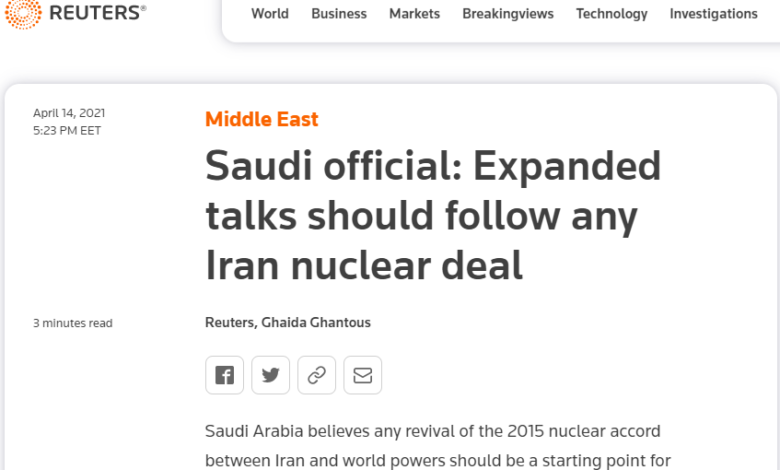
The first round of Saudi-Iranian talks took place in Baghdad on April 9, and included discussions about attacks on Saudi Arabia by Yemen’s Iran-aligned Houthi group, the FT report added, citing one of the officials.
The talks were positive, the official told the FT.
The FT also said that a senior Saudi official denied there had been any talks with Iran. Lebanon’s pro-Iran Al Mayadeen television channel and Unews news agency on Sunday both cited an Iranian source denying talks with Saudi Arabia.
Saudi authorities did not immediately respond to a Reuters request for comment and Iranian officials were not immediately available.
The report comes as Washington and Tehran try to revive a 2015 nuclear accord to which Riyadh had been opposed and as the United States presses for an end to the Yemen conflict, seen in the region as a proxy war between Saudi Arabia and Iran.
Riyadh has called for a nuclear deal with stronger parameters and said Gulf Arab states should join any negotiations on the accord to ensure that this time it addresses Iran’s missiles programme and its support for regional proxies.
Saudi Arabia and its allies supported former U.S. President Donald Trump’s decision in 2018 to quit the world powers’ nuclear agreement and reimpose sanctions on Tehran, which responded by breaching several restrictions on its nuclear activities.
Saudi Arabia believes any revival of the 2015 nuclear accord between Iran and world powers should be a starting point for further discussions bringing in regional states aimed at expanding the deal’s provisions, an official said on Wednesday.
Ambassador Rayd Krimly, head of policy planning at the Saudi foreign ministry, told Reuters that any agreement that does not effectively address concerns about Iran’s missile programme and support for regional proxies would not work.
Saudi Arabia, which had opposed the 2015 accord and is locked in a regional rivalry with foe Iran, earlier on Wednesday issued a statement calling for a nuclear deal with stronger parameters and a longer duration.
“Saudi Arabia is not interested in hindering or blocking the current negotiations … it is interested in ensuring their success in achieving effectively the desired results,” Krimly said, adding that consultations are going on with global powers.
“We want to make sure at a minimum that any financial resources made available to Iran via the nuclear deal are not used … to destabilise the region,” he said.
The talks in Vienna aim to bring the United States and Iran back into compliance with the pact after the Trump administration quit the deal in 2018 and reimposed sanctions on Tehran, which responded by breaching some nuclear restrictions.
Gulf Arab states that supported former President Donald Trump’s maximum pressure campaign against Iran have said they should be involved in any future negotiations.
“We can begin by a nuclear deal and move on to another format that will discuss all these issues in a positive manner,” Krimly said, adding there was consensus among Arab countries and global powers on the need for expanded and inclusive talks.
“Maybe such a process can begin by confidence-building measures, by reducing tensions, by reducing the arms race in the region and then build on these steps towards a better future for all of us,” he added.
The official said Saudi Arabia, which has repeatedly faced missile and drone attacks by Yemen’s Iran-aligned Houthi group, was committed to working towards sustainable peace and security but retains the right to defend itself under international law.
“Our security and stability is not something we will bargain with,” he said.




